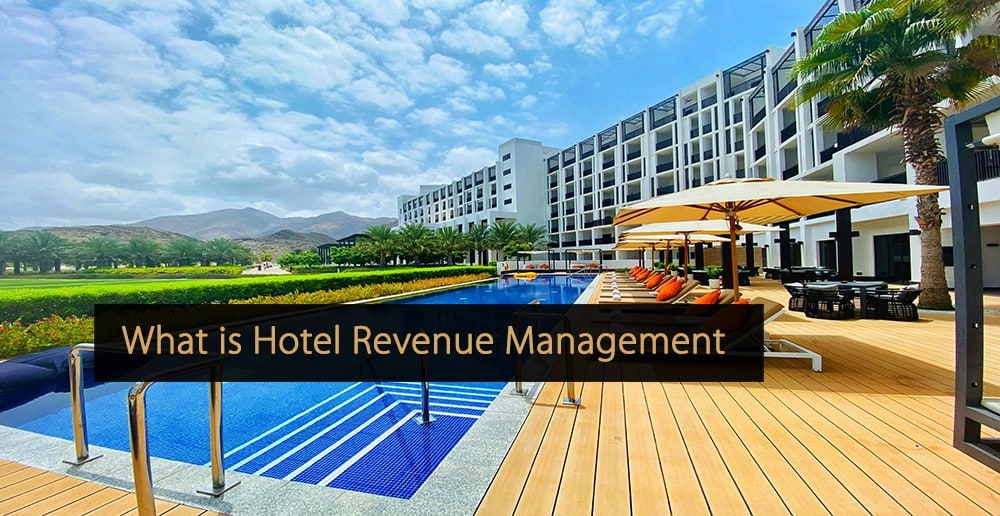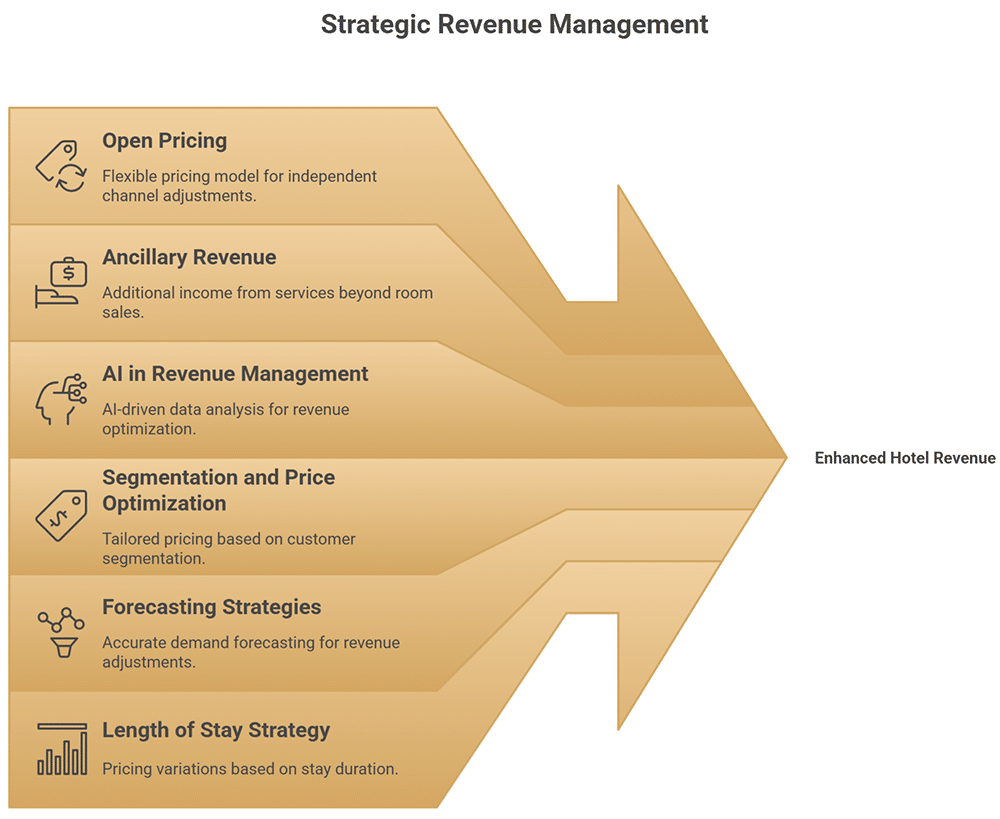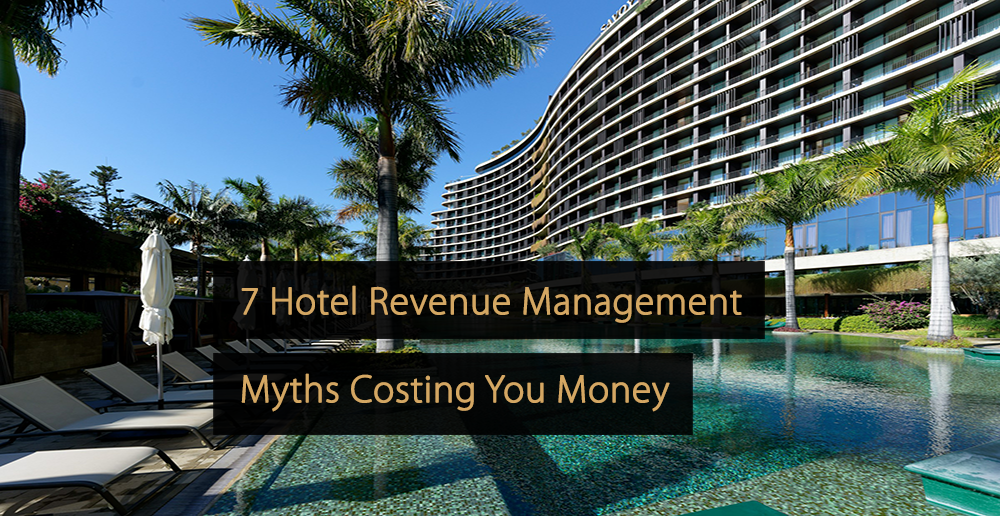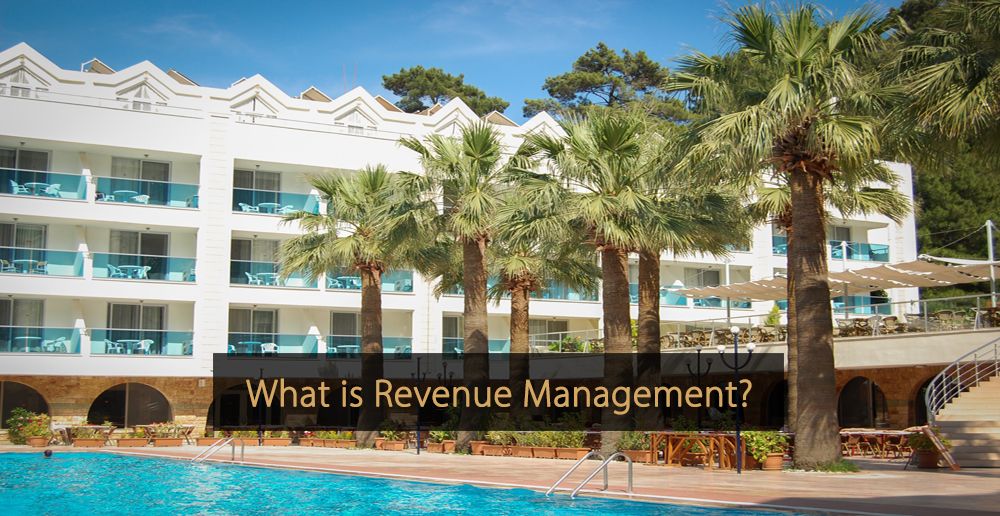For those operating in the hotel industry, revenue management is a key concept, as it enables hotel owners to predict levels of demand and optimize things like distribution and pricing in order to maximize financial results. In this article, you will learn more about hotel revenue management, why it is so valuable to hotel owners, and the necessary conditions for implementing a hotel revenue management strategy.
Table of Contents:
- What is Hotel Revenue Management?
- Necessary Conditions for Hotel Revenue Management
- The Importance of Hotel Revenue Management
- What is the Difference Between Revenue Management and Yield Management
- Hotel Revenue Management Strategies
- Revenue Management in Other Industries
- Hotel Revenue Management Growth Opportunities Through 2035
What is Hotel Revenue Management?
So, what is hotel revenue management? Hotel revenue management uses analytics, performance data, and other information to optimize customer demand for pricing, distribution, and availability. In the process, hotel industry employees can maximize their revenue, improving their overall financial results.. The practice originated in the airline industry during the 1980s before being adapted by hotel pioneer Marriott International in the late 1980s.
In many ways, hotel revenue management is about achieving the best possible balance between supply and demand while understanding customer habits. Crucially, it is more concerned with revenue than occupancy.
According to a Duetto’s survey, 83.9% hotels are currently using a revenue management system (RMS), up from 82.3% in 2023. Hotels typically use analytics, past data, and external information to understand demand levels better. This then allows them to identify patterns, understand when hotel rooms need to be sold at a discount, and anticipate periods of high demand, at which point rooms can be sold for a much higher price.
A simple way to think of hotel revenue management is:
Selling the right room, to the right customer, at the right time, for the right price, via the right distribution channel, with optimal cost efficiency
Video: What is Hotel Revenue Management?
Necessary Conditions for Hotel Revenue Management
It is important to understand that revenue management strategies are not appropriate for all businesses, and certain necessary conditions must exist for it to be relevant. These necessary conditions are as follows:
- A customer base that will willingly pay different prices for the same commodity
- A perishable inventory means that after a certain point, the commodity can no longer be sold
- A fixed number of resources available to be sold at any one time
- A capacity to accurately predict or anticipate changes in demand in advance
These necessary conditions make hotels an ideal business to employ revenue management strategies. After all, customers willingly pay different prices for hotel rooms, depending on demand, time of the year, and other factors, while the hotel has both a perishable inventory and a fixed number of rooms to sell.
EHL Professor Dr. Stefan Güldenberg states:
“Knowing the strengths and weaknesses of your competitors compared to your own is an important part of strategic management and organizational learning. Regular competitor analysis helps you to clarify or update your hotel strategy and to respond effectively to a constantly changing environment.”
The Importance of Hotel Revenue Management
Hotel revenue management is important because the hotel industry itself is highly competitive. Through a robust revenue management strategy, hotel management and finance departments can take more of a data and evidence-driven approach to pricing and distribution decisions instead of relying on guesswork. According to the Duetto Revenue Management Trends & Predictions Survey, hoteliers now rank revenue management 4.8 out of 5 in terms of importance to their business in 2024, up from 4.4 out of 5 in 2023.
If a hotel can more accurately anticipate demand, it can take a more informed pricing approach, dynamically adjusting the strategy to maximize income. This, in turn, is vital because hotels have fixed costs that need to be met regardless of the number of hotel rooms they manage to sell on any given day.
ResearchGate studies show that hotels implementing advanced RMS saw an average 4-7% increase in RevPAR. These improvements are driven by better ADR optimization, strategic rate positioning, and increased profit margins rather than just occupancy rates. For example, Marriott achieved 4.1% global RevPAR growth in Q1 2025 through consistent performance. Meanwhile, Hyatt delivered a 5.7% comparable RevPAR increase in Q1 2025, outpacing the consensus of 3.5% while maintaining forecasted growth of up to 4% for 2025.
Bill Marriott Jr., Chairman and CEO, Marriott International states;
“Revenue management has contributed millions to the bottom line, and it has educated our people to manage their business more effectively. When you focus on the bottom line, your company grows.”
What is the Difference Between Revenue Management and Yield Management
One common area of confusion for hotel owners and others involved with revenue management is the difference between this discipline and yield management. The difference between the two can be briefly summarized by explaining that yield management has a narrower focus and is tactical, whereas revenue management is strategic.
Interestingly, yield management is the older of the two disciplines and is firmly focused on price optimization. Within the hotel industry, this would mean optimizing the price of rooms.
Robert Crandall, former chairman and CEO of American Airlines, gave yield management its name and has called it,
“The single most important technical development in transportation management since we entered deregulation “.
By contrast, revenue management has a wider focus, incorporating ideas like choosing the right distribution channel to minimize the costs involved in making a sale and considering secondary sources of revenue.
Table: Differences Between Hotel Revenue Management and Yield Management
Hotel Revenue Management Strategies
With the global hotel revenue management system market projected to grow at 12.3% CAGR through 2026 to 2033, hotels that are implementing sophisticated revenue strategies gain significant competitive advantages. In this section, you can find useful details about some of the main revenue management strategies available.
Open Pricing
Open pricing is one of the emerging pricing models associated with hotel revenue management. Simply put, this describes an approach to pricing that moves away from the fixed modifiers typically used with a BAR (best available rate) approach. As a result, hotels gain greater flexibility and freedom.
Among the most significant benefits of open pricing is the ability to change pricing for one distribution channel independently from others. This can help to target pricing towards different market segments and also means hotels avoid situations where they have to close off certain channels based on their approach.
This approach shows significant promise within the hotel industry because flexibility means hotels can respond more swiftly and accurately to their current needs. Customers may also benefit from seeing pricing that more accurately reflects the situation or pricing that is more targeted to their market segment.
Research backs this up: a study published in PMC found that hotels using competitive economic pricing strategies achieved measurable gains, with a 5% increase in customer retention leading to profit growth between 20% and 90%. By adopting open pricing, hotels not only capture more immediate revenue but also build loyalty that translates into significant long term profitability.
If you want to learn more about open pricing, its benefits, how it can be implemented, and its relevance to hotel revenue management, read “Open Pricing: Why Is It the Next Hotel Revenue Management Strategy?”
Ancillary Hotel Revenue Management Strategy
An ancillary hotel revenue management strategy involves earning extra income from additional products and services that extend beyond the sale of hotel rooms. This allows you to create a more comprehensive revenue strategy based on your business operations rather than simply focusing on room rates and distribution. According to an Oracle study, 49% hoteliers strongly agree that special amenities and upselling are critical to their revenue strategy.
Some examples of ancillary revenue sources include a hotel restaurant, a hotel gift shop, conference facilities, leisure facilities, spa services, and tours. You might also be able to create partnerships with local businesses and earn a commission on customers you send to them. These ancillary services can also boost the guest experience in your hotel.
Annual industry reports indicate that ancillary revenue can make up more than 18% of a hotel’s total income. For example, CBRE data shows U.S. hotel spas grew spa revenue per available room (PAR) by 12.6% from 2018 to 2022, with resort spas rising 14.2%.
AI in Revenue Management
One of the most exciting revenue management strategies hotel industry figures are now exploring is the use of artificial intelligence technology. As a discipline, revenue management is hugely reliant on data, and AI can analyze huge amounts of data and do so at speeds that humans cannot replicate.
According to the Artificial Intelligence – Worldwide Report by Statista, the global AI market size is projected to grow at a CAGR of 15.83% until 2030. AI can be especially valuable for identifying patterns within data. This could include patterns in demand levels or guest behavior, but some of these patterns may also be less obvious and harder for a human to identify.
AI can continually analyze data, freeing up more staff time while allowing you to optimize your approach. According to the Hotel Revenue Management Systems Statistics report, implementing an RMS powered by machine learning algorithms in early 2025 resulted in a 15% increase in revenue and a notable rise in off-peak season bookings.

Heiko Rieder, Senior Vice President Commercial & Distribution, Step Partners Europe GmbH“In a nutshell, Artificial Intelligence will lead to even greater automation and sophistication in Revenue Management, allowing Revenue Managers more time to focus on interpreting data insights, developing innovative strategies, and experimenting with data they may not have had the time to review thoroughly. There are many examples where AI usage has a direct correlation to improving a hotel’s top line, for example, from e-commerce or guest satisfaction sources, but I find these are often underused. As AI continues to evolve, Revenue Management roles may evolve as well.” Click here to read more about the impact of AI on RMS from our Expert Panel. |
Segmentation and Price Optimization
Price optimization is a major factor in any good answer to the question: What is revenue management? One possible way to achieve this is through segmentation, where you divide your customer base into different ‘types’, look at their behaviors and booking habits, and then attempt to optimize pricing for each segment. For instance, you might charge business customers lower room rates because you know you can recoup the money via their use of corporate facilities.
Real-world examples show the impact of segmentation. A ResearchGate case study highlights how Marriott International implemented its Group Pricing Optimizer (GPO), a smart pricing system designed to set more accurate prices for group bookings, leading to improved revenue outcomes.
Similarly, IHG’s market segmentation analysis emphasizes that “segmentation enables hotel owners to personalize offerings to different groups and expand their revenue capture potential.”
The evolution of segmentation over time also shows its growing importance. As Nooshi Akhavan, Director of Revenue Performance & Distribution at Coast Hotels, explains:
“Twenty years ago, there were just four segments: transient guest (business and leisure weren’t divided then), group guest, tour, wholesale, and crew. Today, I’ve seen hotel brands that have 18 market segments.”
Forecasting Strategies
One of the most important aspects of hotel revenue management is forecasting demand accurately. It allows hoteliers to anticipate future demand and revenue, enabling necessary adjustments to be made. Within the hospitality industry, high-quality forecasting relies on accurate records, including occupancy, room rates, and revenue.
Accurate forecasts do more than increase profit; they prevent costly missteps. According to HSMAI (Hospitality Sales and Marketing Association International), 72% of hotel managers reported that inaccurate forecasts led to pricing issues and missed revenue opportunities. This highlights the importance of investing in robust forecasting systems that combine machine learning with human expertise.
A study in Current Issues in Tourism showed machine learning models cut forecast error by up to 54% for next-day predictions and 45% for two-week forecasts compared to basic statistical methods. These improvements allow hotels to set more effective rates and improve operational planning.
As Dr. Cindy Heo, Associate Professor of Revenue Management at EHL, explains:
Demand forecasting plays a critical role in revenue management by providing data-driven insights into future customer behavior. Accurate forecasts allow hoteliers to set the right room rates, optimize inventory, and improve operational planning, all of which enhance revenue and guest satisfaction.”
Total Revenue Management (TRevPAR Strategy)
Total Revenue Management represents the evolution beyond traditional room-focused strategies to encompass all hotel revenue streams. Total Revenue Management (TRevPar) allows hotels to optimize revenue across various departments, such as food and beverage, spa, conference facilities, and other ancillary services.
This holistic approach measures Total Revenue Per Available Room (TRevPAR), providing a comprehensive view of property performance. TRevPAR strategies require cross-departmental collaboration and integrated systems to optimize pricing and availability across all revenue centers simultaneously.
A study conducted by Sheryl E. Kimes of Cornell University School of Hotel Administration titled “The Future of Hotel Revenue Management” shows that GOPPAR and TRevPAR are indicated as the most important benchmarks, with 33.7 and 17.5 percent of respondents supporting this idea.
You can learn more about the role of total revenue management in the hotel profitability in the article, “Total Revenue Management: How Hotels Can Maximize Their Revenue.”
Revenue Management in Other Industries
Finally, it is important to understand that hotel revenue management is not the only form of revenue management. The practice originated in the airline industry. To this day, airline companies often use dynamic pricing and share many methods of anticipating future demand that hotels use.
According to Skift Research, the integration of AI into airline revenue management is seen as a multi-billion-dollar opportunity. AI is potentially boosting airline profitability by up to 1 percent today which represents a $30 billion revenue opportunity. Fortunately, hotels are experiencing similar benefits.
Moreover, revenue management practices have become commonplace in other industries away from the travel and tourism industry, with examples including financial services, theatres, and even medical services.
Hotel Revenue Management Growth Opportunities Through 2035
The hotel industry is stepping into a new era shaped by smart technology. Over the next decade, revenue management will evolve rapidly, driven by artificial intelligence, sustainability, and rising guest expectations.
The global hotel market, worth $785 billion in 2023, is expected to grow to $1.13 trillion by 2030. At the same time, the hotel revenue management system market is set to double, growing from $1.2 billion in 2024 to $3.4 billion by 2033. Growth will be especially strong in Asia Pacific and the Middle East, with Saudi Arabia hosting global events like Expo 2030 and the 2034 FIFA World Cup. Hotels are investing heavily, over $1 billion a year, in technology that uses AI to set room prices based on demand, competition, and real-time data.
This new generation of revenue tools does more than adjust room rates. They help hotels price and manage everything, from spa services to event spaces, based on real-time trends. At the same time, travelers are looking for greener hotels. Up to 78% of guests prefer eco-friendly stays, and many are willing to pay more. Hotels with strong sustainability practices can now charge premium prices and secure better financing.
By 2035, automated pricing, voice-activated bookings, virtual reality property tours, and blockchain-based direct booking systems will create new revenue opportunities while reducing distribution costs. Hotels that master these strategies will stand at the forefront of an industry worth trillions, built on smart pricing and guest-centric innovation.
Optimizing financial results in a highly competitive hotel industry is usually the key to achieving long-term success. Through a carefully coordinated revenue management strategy, hotel owners can more accurately anticipate changing demand levels and then use that information to make informed decisions about pricing and distribution.
Did You Like This Article About Hotel Revenue Management?
You might also be interested in the following articles:
- Revenue Manager Job Description: What to Look For?
- Why is Rate Parity Vital for Hotels? & Tips to Win the Parity Game
- Hotel Budget: Effective Budgeting Tips for Hoteliers
- Hotel Restaurant Management: Tips to Maximize Revenue for Your Hotel
- Restaurant Revenue Management Strategies for Successful Managers
More Tips to Grow Your Business
Revfine.com is the leading knowledge platform for the hospitality and travel industry. Professionals use our insights, strategies, and actionable tips to get inspired, optimize revenue, innovate processes, and improve customer experience.Explore expert advice on management, marketing, revenue management, operations, software, and technology in our dedicated Hotel, Hospitality, and Travel & Tourism categories.











Leave A Comment